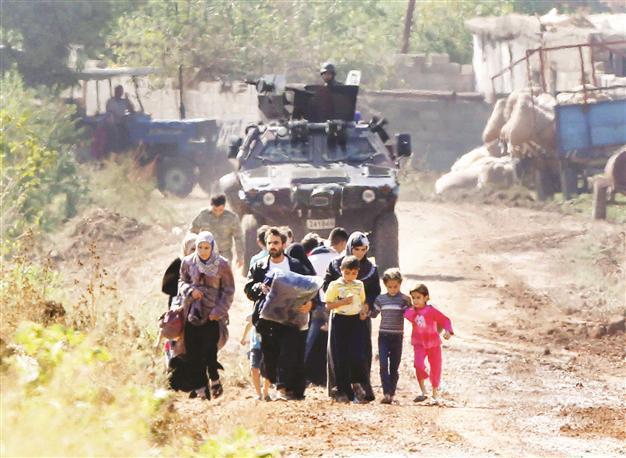Plane interception is not ‘exceptional’
ANKARA - Hürriyet Daily News

Syrians walk after crossing to Turkey via Orontes River of the Turkish-Syrian border. Clashes between rebels and the Syrian army intensify near the border. REUTERS photo
Examinations into incidents from 2011 and 2012 have revealed that the recent forced landing of a Syrian plane by Turkish authorities on suspicion it was carrying military material was not an extremely exceptional event.
In late 2011, some civilian Russian and Ukrainian cargo planes abandoned their flight paths over Turkish airspace en route to Syria upon Ankara’s notification they could be subject to inspection.
Since pro-democracy protests in Syria turned bloody Turkey has stepped up its efforts to block the delivery of arms shipments to the Arab country. Attempts to illegally ship cargo to Syria through Turkey have reportedly seen a gradual decline in 2012.
Turkey scrambles two jets
Five Iranian trucks bound for Syria with dual-use materials that could be used for arms production were stopped and intercepted in Turkey in 2011 and early 2012. One of five trucks was found to be carrying chemicals that could have possibly been used in the making of chemical missiles. Turkish prosecutors asked an expert from U.N. nuclear watchdog, the International Atomic Energy Agency (IAEA), to come to Turkey to study the freight contents at the time. The expert’s study asserted that the load was indeed in violation of a U.N. embargo on Syria and the cargo was confiscated.
Meanwhile, Turkey scrambled two fighter planes to the border with Syria on Oct. 12 after a Syrian military helicopter bombed the Syrian border town of Azmarin, according to Reuters. There has been intense fighting between rebels and Syrian government forces this week in Azmarin and neighboring towns, an area strongly opposed to President Bashar al-Assad’s rule.
In another case, four Iranian trucks were stopped in Kilis province and were found to be carrying dual-use tools that could be used in the making of ballistic missiles. In two of the incidents, the shipping was carried by Turkish transport companies. Both cargo loads were confiscated and the trucks were sent back to Iran where they had come from.
In early 2012, The Iranian Embassy to Turkey denied that the four trucks were carrying military equipment from Iran to Syria. In 2011, Turkey announced a series of sanctions against Syria and declared it would increase inspections of cross-border traffic in order to block arms deliveries to its neighbor.
